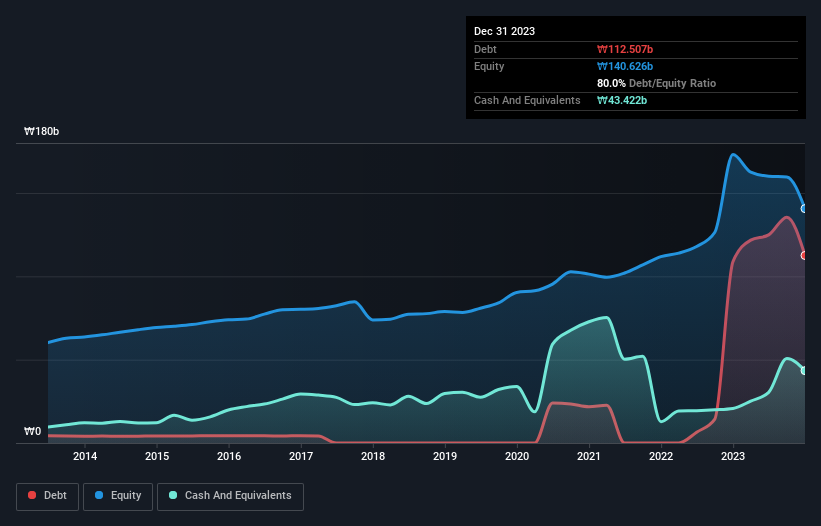- South Korea
- /
- Semiconductors
- /
- KOSDAQ:A102120
We Think ABOV Semiconductor (KOSDAQ:102120) Has A Fair Chunk Of Debt
David Iben put it well when he said, 'Volatility is not a risk we care about. What we care about is avoiding the permanent loss of capital.' So it might be obvious that you need to consider debt, when you think about how risky any given stock is, because too much debt can sink a company. Importantly, ABOV Semiconductor Co., Ltd. (KOSDAQ:102120) does carry debt. But is this debt a concern to shareholders?
When Is Debt Dangerous?
Generally speaking, debt only becomes a real problem when a company can't easily pay it off, either by raising capital or with its own cash flow. In the worst case scenario, a company can go bankrupt if it cannot pay its creditors. While that is not too common, we often do see indebted companies permanently diluting shareholders because lenders force them to raise capital at a distressed price. Of course, plenty of companies use debt to fund growth, without any negative consequences. The first thing to do when considering how much debt a business uses is to look at its cash and debt together.
See our latest analysis for ABOV Semiconductor
What Is ABOV Semiconductor's Net Debt?
As you can see below, ABOV Semiconductor had ₩112.5b of debt, at December 2023, which is about the same as the year before. You can click the chart for greater detail. However, it also had ₩43.4b in cash, and so its net debt is ₩69.1b.

A Look At ABOV Semiconductor's Liabilities
According to the last reported balance sheet, ABOV Semiconductor had liabilities of ₩108.9b due within 12 months, and liabilities of ₩38.8b due beyond 12 months. On the other hand, it had cash of ₩43.4b and ₩22.9b worth of receivables due within a year. So it has liabilities totalling ₩81.4b more than its cash and near-term receivables, combined.
While this might seem like a lot, it is not so bad since ABOV Semiconductor has a market capitalization of ₩298.6b, and so it could probably strengthen its balance sheet by raising capital if it needed to. However, it is still worthwhile taking a close look at its ability to pay off debt. The balance sheet is clearly the area to focus on when you are analysing debt. But you can't view debt in total isolation; since ABOV Semiconductor will need earnings to service that debt. So if you're keen to discover more about its earnings, it might be worth checking out this graph of its long term earnings trend.
In the last year ABOV Semiconductor had a loss before interest and tax, and actually shrunk its revenue by 4.2%, to ₩232b. We would much prefer see growth.
Caveat Emptor
Importantly, ABOV Semiconductor had an earnings before interest and tax (EBIT) loss over the last year. To be specific the EBIT loss came in at ₩15b. When we look at that and recall the liabilities on its balance sheet, relative to cash, it seems unwise to us for the company to have any debt. So we think its balance sheet is a little strained, though not beyond repair. We would feel better if it turned its trailing twelve month loss of ₩13b into a profit. So in short it's a really risky stock. There's no doubt that we learn most about debt from the balance sheet. However, not all investment risk resides within the balance sheet - far from it. For example, we've discovered 3 warning signs for ABOV Semiconductor (2 shouldn't be ignored!) that you should be aware of before investing here.
Of course, if you're the type of investor who prefers buying stocks without the burden of debt, then don't hesitate to discover our exclusive list of net cash growth stocks, today.
Mobile Infrastructure for Defense and Disaster
The next wave in robotics isn't humanoid. Its fully autonomous towers delivering 5G, ISR, and radar in under 30 minutes, anywhere.
Get the investor briefing before the next round of contracts
Sponsored On Behalf of CiTechNew: Manage All Your Stock Portfolios in One Place
We've created the ultimate portfolio companion for stock investors, and it's free.
• Connect an unlimited number of Portfolios and see your total in one currency
• Be alerted to new Warning Signs or Risks via email or mobile
• Track the Fair Value of your stocks
Have feedback on this article? Concerned about the content? Get in touch with us directly. Alternatively, email editorial-team (at) simplywallst.com.
This article by Simply Wall St is general in nature. We provide commentary based on historical data and analyst forecasts only using an unbiased methodology and our articles are not intended to be financial advice. It does not constitute a recommendation to buy or sell any stock, and does not take account of your objectives, or your financial situation. We aim to bring you long-term focused analysis driven by fundamental data. Note that our analysis may not factor in the latest price-sensitive company announcements or qualitative material. Simply Wall St has no position in any stocks mentioned.
About KOSDAQ:A102120
ABOV Semiconductor
Designs, manufactures, and sells microcontrollers, and memory and semiconductor solutions in South Korea and internationally.
Mediocre balance sheet and slightly overvalued.
Market Insights
Weekly Picks

Early mover in a fast growing industry. Likely to experience share price volatility as they scale


A case for CA$31.80 (undiluted), aka 8,616% upside from CA$0.37 (an 86 bagger!).


Moderation and Stabilisation: HOLD: Fair Price based on a 4-year Cycle is $12.08
Recently Updated Narratives


Title: Market Sentiment Is Dead Wrong — Here's Why PSEC Deserves a Second Look


An amazing opportunity to potentially get a 100 bagger

Amazon: Why the World’s Biggest Platform Still Runs on Invisible Economics
Popular Narratives


MicroVision will explode future revenue by 380.37% with a vision towards success


Crazy Undervalued 42 Baggers Silver Play (Active & Running Mine)


NVDA: Expanding AI Demand Will Drive Major Data Center Investments Through 2026
Trending Discussion


